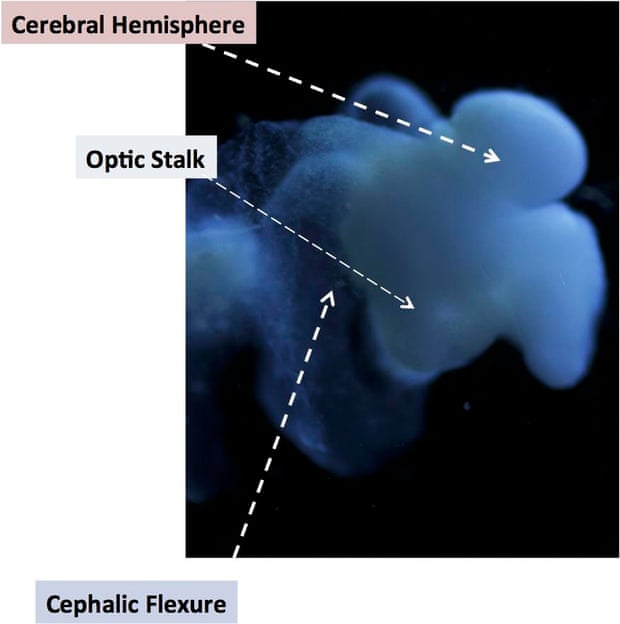The above is an image of an alleged brain created through induced pluripotent stem cells, i.e., the ones that don't involve destroying human embryos. My BS meter is kind of high for this story but I can't help but to think of the ramifications.
Ever since I had heard of this method of creating stem cells - or at least the success of a particular Japanese researcher around five years ago - I was mostly happy that scientists could pursue advances in this promising field without the ethical issues involved in embryonic stem cell research. It might be slower and with opportunity costs, but medical experimentation has had a problematic enough history that I think it best to err on the side of least destruction.
However, recreating the nervous system is a bit unnerving. (Pun intended, but hopefully not as predictable as the partisan comments flooding the news story)
The brain is a special organ, primus inter pares. You can replace any other organ and still retain your basic identity. We can say that John got a kidney or heart transplant from Jim and we understand that John is still John. But, if it were even possible, we would not say that John got a brain transplant; rather, we would describe it as Jim living in John's body.
There is a special relationship between personhood, identity, and the brain. People with brain damage are often described as a completely different person whereas there is no question of identity in the case of, say, heart or lung damage.
So this raises a number of questions. Is this primitive nervous system conscious? If it is, then is it a person? From the press release, this pencil eraser sized brain is roughly equivalent to a fetal brain at 5 weeks and cannot develop further without a suitable cardiovascular support system.
If consciousness is an emergent property, then at what point does it emerge during development? The lead researchers and some commentators suggest that it could not be conscious on account of the following reasons:
1) It has not received any sensory input
2) There is no electrical activity
3) It does not consume glucose (??)
1) Perhaps, though the existence of an optic stalk suggests that background noise could provide some kind of sensory input. There would be nothing to make sense of, so to speak. Perhaps existence at this point is like those dreamless portions of sleep. A kind of living death. Some comments suggested the fact that people in sensory deprivation tanks do have conscious experiences despite the lack of sensory input but fail to mention that those people have already had plenty of sensory input. There is plenty for the mind to think about.
Nihil est in intellectu quod non prius in sensu. Nothing is in the mind that is not first in the senses. But is sensory input a necessary and/or sufficient condition for consciousness?
2) Similarly, is electrical activity a necessary condition for consciousness in nervous systems? fMRI scans wont show anything, but if there is neurochemical activity going on, then there is some electrical activity as well. Well, in any living system there is going to be significant electrical activity, but whether it is meaningful enough to constitute consciousness is tricky.
Some commentators are quite sure nothing is going on but given the fact that this system came about through stem cells, there had to be quite a bit of growth and an enormous amount of activity going on of a biological type not comparable to the physical activities occurring in, say, bricks. That doesn't stop commenters though.
How certain can you be that a brick is not conscious? Everything we call "conscious" has means of being conscious of its environment - through input and processing of sensory data. If there's no input or processing of data - which appears to be the case for a brick or lump of tissue - then how could it be conscious? I think it's much more difficult to prove that computers and smartphones aren't conscious because they DO input and process data.
3) One commentator suggested that this system does not consume glucose and produce ATP.
Brains can't think without ATP. The brain is not consuming glucose. Glucose is necessary for production of ATP. It's done. I've refuted the idea that this brain can think. There is nothing you can say to refute what I have said.
At some point, even if this particular story ends up being a sham, scientists will likely be able to grow a brain and the infamous brain in a vat philosophical issues might just become real ones.

No comments:
Post a Comment
Note: Only a member of this blog may post a comment.